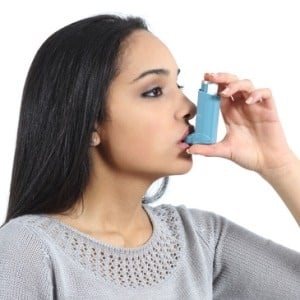
Asthma can be a dangerous, life-threatening disease if not managed properly. But it’s a condition that lends itself to self-care. This means that its management really is in your hands.
Asthma treatment has two goals:
- Achieving control
- Controlling your symptoms over time, thereby reducing the risk for future asthma attacks
Asthma treatment also consists mainly of two types of medicine:
- Reliever therapy that opens up your airways to ease your symptoms immediately and long-term
- Daily controller medicines to help control the inflammation in your airways
The two therapies (reliever and controller/preventative therapy) may involve two separate inhalers, or a single (combination) inhaler (e.g. Foxair, Seretide, Sereflo, Symbicord, Relvar).
Both controller and reliever medication are usually inhaled, but some can be given orally or intravenously in the case of an emergency.
To achieve the best control, it’s important to understand how these medicines work. Your exact prescription will depend on how often you experience symptoms and how serious they are.
A. Reliever therapy
Examples: Ventolin, Asthavent, Venteze, Bricanyl
Reliever therapy is the first-line relief therapy for most people living with asthma. You should always carry this medication with you.
Reliever pumps are also known as bronchodilators, and they do exactly what the name suggests: they dilate the airways (or bronchial tubes), so that you can breathe more easily. The reliever medications act very quickly: within 5-10 minutes, you’ll feel better.
For mild, intermittent asthma, short-acting relievers are the only medicines needed. They can also be taken before exercise if you experience exercise-induced asthma. The medication works for 4-6 hours.
Note that relievers don’t treat the underlying inflammation associated with asthma. This is what your controller/preventative therapy is for.
B. Daily controller and preventative therapy
Controller medicines are regarded as the most important part of the asthmatic’s treatment regimen.
These medicines decrease the chronic inflammation and swelling in the airways, ensuring that your semi-closed airways can once again be fully open during the day and night.
Controller therapy also helps to prevent permanent damage to the airways and should be used every day – even if you’re not experiencing symptoms.
Several doses of the controller medication can be used every 10 minutes in an acute asthma attack (until you get to the doctor).
If your asthma is controlled for more than three months in a row, your doctor may consider lowering the dosage of your controller medication. In turn, it’s important to contact your doctor as soon as you experience warning signs of worsening asthma, so that he or she can determine whether your medicine dose should be increased.
Before increasing the dose of your controller therapy, your doctor will have to make sure that you’re taking your medicines exactly as prescribed. Are you forgetting to use your medicines or skipping some days? Tell your doctor, and work on a plan together.
If you’re not sure if you’re using your inhaler(s) correctly, it’s best to take the inhaler(s) along to your doctor to show him/her how you use it. You might need a bit of assistance in mastering the technique. If you still struggle, you could try using a spacer with your inhaler pump, or a dry powder inhaler.
Talk to your doctor about these options.
There are different types of controller and preventative therapies. These include:
1. Inhaled steroids
Examples: Beclate, Inflammide, Budeflam, Pulmicort, Flixotide, Fluticasone furoate (in Relvar), Mometasone
Most inhaled steroids are packaged as metered-dose aerosol pumps or dry powder inhalers, and the devices are called diskhalers, turbohalers, spinhalers, rotahalers or autohalers.
Inhaled steroids reduce the chronic swelling (i.e. inflammation) in the airways, opening them up. When the lining is no longer inflamed, the airways are less sensitive to triggers. This means that the frequency and severity of asthma attacks are reduced.
Your symptoms will decrease within 1-2 weeks after starting to use an inhaled steroid, with maximum improvement after several weeks. Note, however, that control deteriorates within a week after stopping this steroid therapy.
If proper asthma control isn’t achieved with a low dose of an inhaled steroid, the next step is to either increase the dose or to add a second controller. Speak to your doctor about the correct treatment plan for you.
Note that inhaled steroids are perfectly safe to use every day. The steroids are sprayed directly into your lungs and have very little effect on the rest of the body.
2. Long-acting beta-agonists
Examples: Serevent, Foradil, Foratec, Oxis, Vilanterol (in Relvar)
The airway-opening effect of the long-acting beta-agonists (LABAs) lasts about 12 hours (Vilanterol lasts 24 hrs), which is why they need to be taken at least once or twice every day.
These medicines are often prescribed in combination with inhaled steroids.
3. Other controller medicines
If your doctor needs to step up your treatment by adding a second or third controller, this will be a leukotriene modifier (e.g. montelukast in Singulair or zafirlukast in Accolate), or slow-release theophylline. The latter is only used when the other medicines are not available.
C. Oral corticosteroids
Examples: prednisone, prednisolone, methylprednisolone
When your asthma isn’t well-controlled, even on high dosages of inhaled steroids plus one or more of the add-on therapies, or in the case of very severe, persistent asthma, oral corticosteroids will be prescribed.
Oral corticosteroids control inflammation over a few hours during a period of poor control and an acute attack. It’s usually prescribed for about 5-7 days in adults to bring the inflammation under complete control. It shouldn’t be prescribed as long-term treatment due to its serious side effects.
D. Other possible treatments
If you have asthma, you may encounter a few other medicines along the way. These include:
- Antibiotics. Note that antibiotics are seldom necessary, as viral infections are by far the most common triggers of asthma (and antibiotics are ineffective against viruses).
- Cough mixtures. You might be tempted to use cough medicine, but these offer very little relief from a tight chest, as coughing is most likely a sign of poor asthma control. Instead, you probably need reliever medication or a change in dosage. Talk to your doctor.
Take note: Sedatives (sleeping pills) should be strictly avoided if you have asthma, as they may suppress breathing and aggravate your symptoms. They’re especially dangerous if you suffer from severe asthma.
Your asthma treatment goals
Taking your medicines exactly as prescribed is very important in managing your asthma.
It’s particularly important that you use your inhaled steroid every day, without fail, even if you’re not experiencing any asthma symptoms.
Your asthma should be treated so effectively that:
- You’re free of symptoms.
- You can maintain normal activity levels, including sporting activities and exercise.
- You achieve the best possible lung function, i.e. good peak-flow readings.
- You have the minimum number of attacks and the need for hospitalisation never arises.
- You have none or very few side effects as a result of the medicines you’re taking.
Any acute attack should prompt your doctor to step up your controller therapy or check that you’re taking your controller therapy every day.
Asthma medicine side effects
If you experience any of the following side effects, it’s important to talk to your doctor:
- Shakiness
- Heart palpitations
- Muscle cramps
- Throat irritation after inhaler use
- Hyperactivity
- Headache after using your inhaler
- Difficulty sleeping
- Irritability
- Coughing
- Dry mouth
- Nervousness
- White patches in the mouth (thrush)
- Heartburn
If you shake or feel your heartbeat when using your reliever, you’re probably using too much or your inhaler technique is poor. A health care professional should be able to assist.
It’s important to rinse your mouth with water after using the steroid inhaler to prevent throat irritation or white patches in your mouth (thrush).
The good news is that most side effects of asthma medication can be managed effectively.
Asthma treatment – a few last points
- Make a point of learning how to distinguish between your reliever and controller pump, and exactly when to use which one. Reliever pumps are often blue in colour, while controller pumps are generally brown in colour.
- Depending on the severity of your asthma, you may only need a reliever pump. If your asthma isn’t controlled, you’ll need controller therapy (usually a steroid pump) or a combination pump that contains both a reliever and a controller. If you’re using a short-acting reliever pump, you’ll need to use the reliever pump whenever you become aware of symptoms.
- You need to master your inhaler technique to achieve optimal control.
- Use a spacer with your metered-dose inhaler or a powder device if you’re having difficulty with your inhaler technique (read article on how to use your inhaler pump correctly).
- Continue using your inhaled steroid, even if you have no asthma symptoms (unless your doctor tells you otherwise).
Reviewed by independent healthcare consultant Prof Praneet Valodia and pulmonologist Prof Elvis Irusen, Head of the Division of Pulmonology at the Faculty of Medicine and Health Sciences, Stellenbosch University. October 2018.
Read more:




 Publications
Publications
 Partners
Partners












